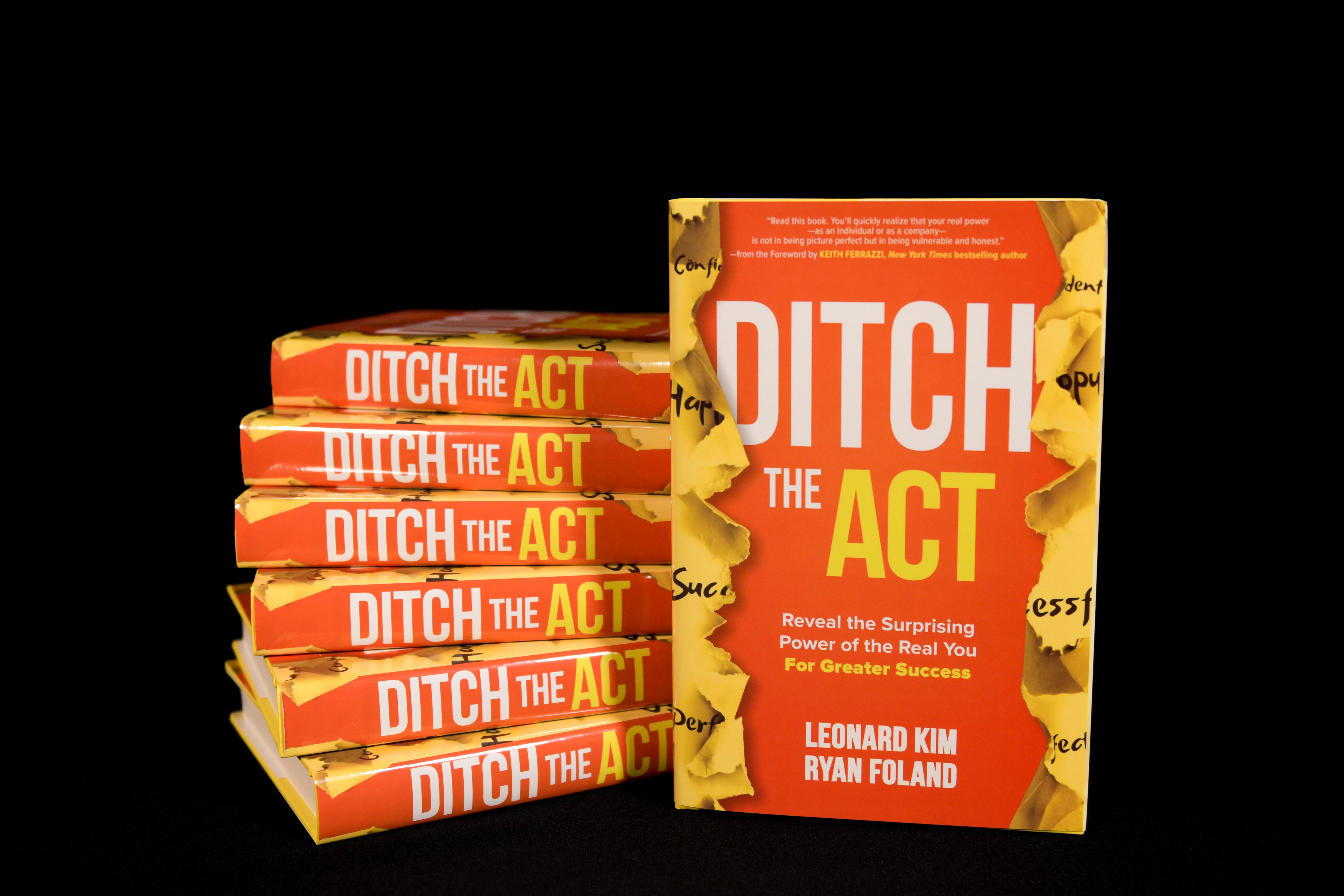Ditch the Act demonstrates how revealing your failures and weaknesses is an essential element in building and sustaining a viral personal brand to help propel your relationships, your career, and/or your business. In this book, we’ll show how ditching your act and getting vulnerable creates a unique and somewhat ironic combination of differentiation and like-mindedness with your audience.
As marketing and communications experts in the corporate, academic, and start-up world, we understand both the reality and the pervasiveness of failure, weakness, and frustration. According to the U.S. Bureau of Labor Statistics, about 50 percent of new businesses survive five years or more, and only one-third survive more than ten years. Failure is not just relegated to business, though. Around 50 percent of marriages end in divorce, which is to say nothing of interpersonal relationships. Aside from failure, all of us suffer from fears, exasperations, or perceived shortcomings. While these are common experiences, however, our natural tendency is to hide the skeletons in our closets—not just the things we’ve done but the things done to us—and construct facades of perceived strength. This is how most people build their brands. The trouble is, facades and false images hide who we really are and block true, authentic, and meaningful connection with others—and ourselves.
We live in a world that rewards experts, gurus, and thought leaders. We’ve been told that the way to join their ranks is to share your success stories, offer practical advice, and thus convince others of your value. This, we are told, is why people return. The value you offer them. The problem is that it becomes extremely difficult to stand out when thousands if not millions of others are making the same play. It’s also only half the story of who you really are.
What if you came at it from another angle? An angle that’s not based on your ability to build yourself up and convince others to put you on a pedestal. An angle that’s based instead on your ability to be real and show others that you’re, in fact, not better than they are but rather a lot like them.
In Ditch the Act, we share our own stories of failure and weakness, and show how vulnerably exposing those stories helped us connect with others and cultivate large, authentic, trustworthy personal brands. We share how Leonard’s naïveté and arrogance—his narrogance as he calls it—led him from failure to failure early in his career. It’s quite pitiful actually. Believing success would be easy, and arrogantly refusing jobs that he felt were beneath him, he eventually found himself alone and broke, reevaluating his life and whether it would be best to just end it all. Only in his rock-bottom moment could he objectively evaluate his failures. In that evaluation—and perhaps as a last-ditch effort to convince himself of his own value—he began to expose himself through his writing. Through his exposure, Leonard was shocked to find an empathetic, loyal, and growing fan base.
Ditch the Act demonstrates how exposing your failures and weaknesses is an essential element in creating an authentic personal brand . . . We’ll show how ditching the act and getting vulnerable is the best way to differentiate and grow your brand, while cultivating brand loyalty.
Likewise, we share Ryan’s story, how he experienced his own series of setbacks. Bullied as a kid, he struggled to achieve in an effort to prove his worth. He dove into martial arts and hockey to show his tenacity and toughness. After college, he did what he could to get ahead, trusting others who promised him an easy path to success, wealth, and popularity. It didn’t work. Ultimately, Ryan and his business partner at the time were investigated by the Federal Trade Commission (FTC) in connection with his partner’s activities. After settling with the FTC and coming through the darkness of that period, Ryan set out to learn how manipulation, poor communication, and betrayal had swept him into a string of failures and an FTC investigation. Through the process, he too began vulnerably sharing his story and the lessons he learned from it.
Eventually, we’d meet at a dinner party thrown by entrepreneur and New York Times bestselling author Keith Ferrazzi. There, Keith asked us to pair up and share one area of need or vulnerability in our own lives. Having never met before, the two of us paired up and began exposing ourselves. We discussed setbacks and legitimate areas of need and ultimately discovered we each had something to offer the other. We discovered, too, that our unique abilities and areas of expertise grew from a commitment to vulnerability and surprising honesty. Over the following months, we’d partner in creating InfluenceTree, a personal branding and professional recognition company, to share our expertise with others, an expertise centered in our mutual commitment to transparency and vulnerability.
Readers, clients, and customers connect to human stories, stories of those who’ve overcome failure or weakness and have learned lessons in the process. Yet when it comes to our own lives, how many of us are able to ditch the act and be that transparent? How many of us are afraid to be vulnerable with others for fear that they will judge, stereotype, or misunderstand us?
Facades and false images hide who we really are and block true,
authentic, and meaningful connection with others—and ourselves.
Ditch the Act shows you why exposure is important and how it helps cultivate connection and grow personal brand loyalty better than any polished persona can. It also teaches you what to expose through the development of a personal, proprietary “Exposure Résumé,” which strategically prompts you to list your most valuable failures, setbacks, or perceived weaknesses and then clarify the key lessons that can be shared with others. Once those lessons are understood through the creation of your new résumé, Ditch the Act leads you through a practical eight-step process we use with ourselves and all our clients that is designed to help you use the fresh exposure and lessons to drive brand differentiation and growth:
- Craft your unique bio, personal brand positioning, and strategy.
- Find what makes you unique and identify the problem you are best suited to solve.
- Create stories and insights based on your Exposure Résumé.
- Speak your truth and give your stories an audience and then spend time, effort, and marketing dollars where you see
performance. - Extract key content pieces to turn into video scripts you will post, share, and embed in content you’ve already published.
- Nourish streams of content to stay top of mind.
- Foster camaraderie in new relationships.
- Stack your successes.
Ditch the Act is an important, unique book for all who are tired of trying to build and manage their brand by fostering a polished persona that others might admire but that you know is at least partly made to fit the standard of society, yet may not be true. It’s a book for those who are ready to ditch the act and stop working so hard to be something they aren’t. Ditch the Act is for those who want to harness the power of vulnerability and authenticity to build a better, more believable, more profitable personal brand—whether in their relationships, in their career, or in business—and enjoy a clean conscience while doing it.

Excerpt from Ditch the Act. ©2019 by Leonard Kim and Ryan Foland. For more resources and worksheets, visit DitchTheAct.com.
Follow us here and subscribe here for all the latest news on how you can keep Thriving.
Stay up to date or catch-up on all our podcasts with Arianna Huffington here.



